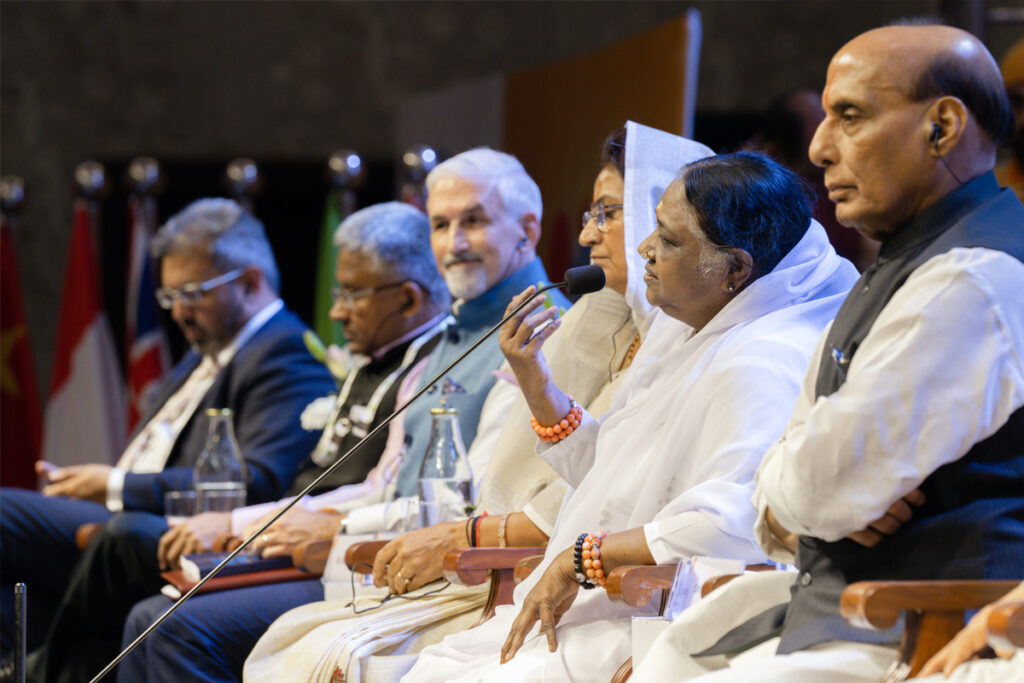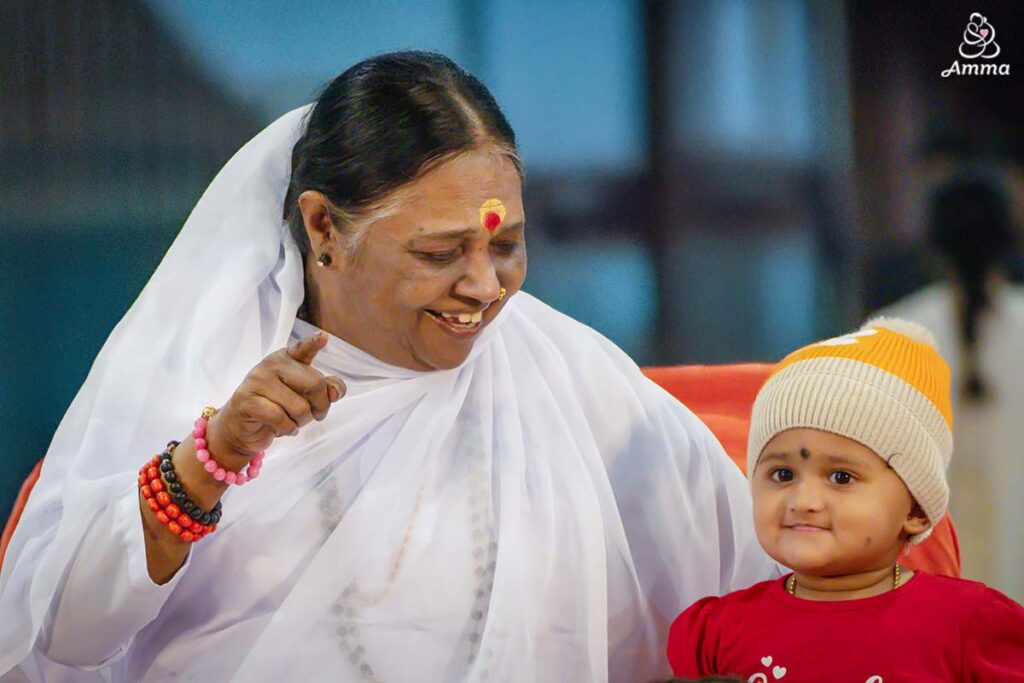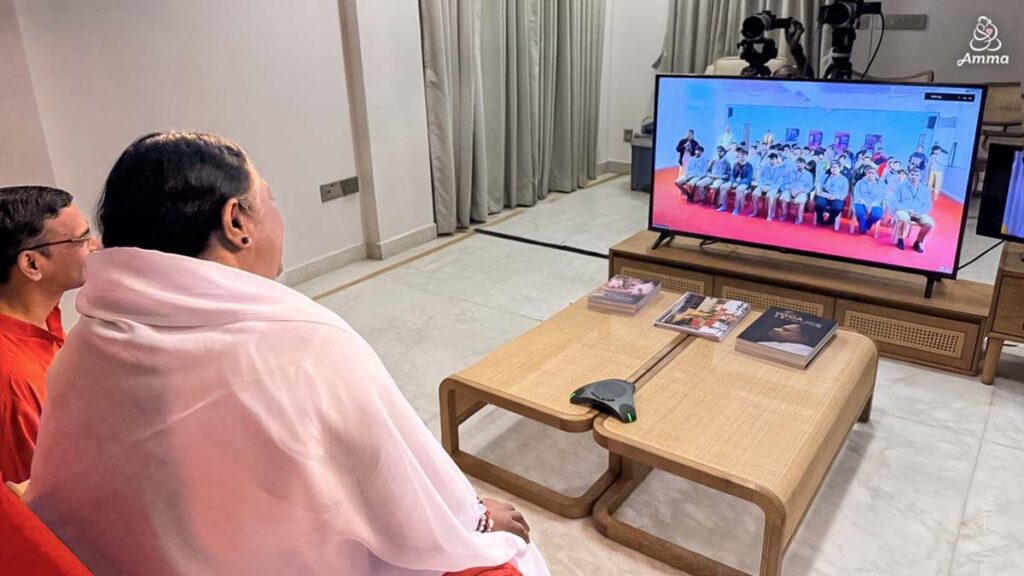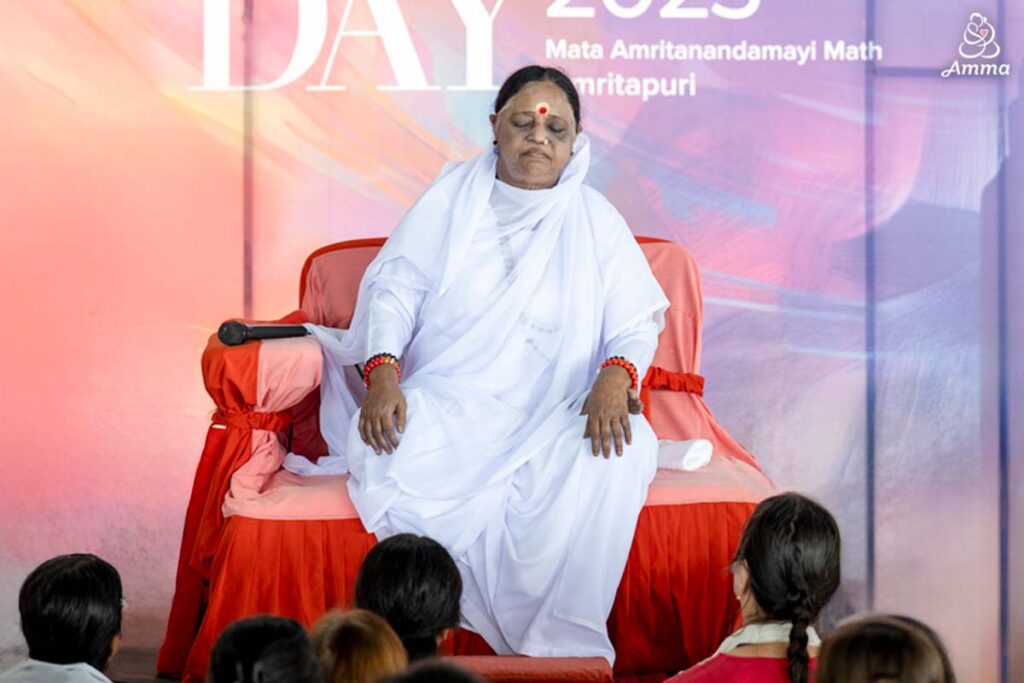The Civil 20 Summit has concluded in Jaipur, Rajasthan. It is an Engagement Group of the G20 that represents the concerns of volunteer organisations on local, national, and international levels. With Amma as Chair, she is inspiring all of us to become lights that shine with compassion to address urgent global needs.
Today’s summit marks the culmination of the C20 working groups’ dedicated efforts spanning the past seven months, led by India in its role as the current presidency of the G20 nations. We believe that we have made sincere efforts to fulfill the trust and responsibility bestowed upon me by the Indian government and the Honourable Prime Minister, Shri Narendra Modi.
The Civil 20 forum has enabled us to communicate openly with the representatives of the G20 nations. The activities of the Civil 20 forum were officially implemented through 16 engagement groups. During the last seven months, hundreds of summits, conferences, and one-day seminars were organised in almost all states of India, as well as in other G20 nations, on the challenges confronting nature and humankind. We were able to share our thoughts and opinions, and to suggest some practical solutions.
One of the key insights that arose from the deliberations was that in order to ensure the long-term existence and safety of humanity, it is necessary to embrace certain overarching values and principles, and work together as a unified whole. Indeed, the emergence of such a sentiment can be seen as a positive sign, opening the path for hope.
There will always be some people who will discourage us and obstruct our progress. We should never allow them to shake our confidence or conviction in fulfilling our svadharma [personal duty]. Only if we have self-confidence can we benefit society through our efforts. Self-confidence is helpful for making forward progress. We convene meetings now, but we should make it possible for our hearts also to meet.
Let me share with you some of my experiences associated with our Ashram’s social upliftment programs. As a child, Amma used to go to homes in the village during the monsoon season. Most homes were small, measuring anywhere between 250 to 500 square feet and had thatched roofs.
Some people would repair their roofs once a year, while others would not have enough money. It cost a mere 10 rupees (US $0.12) those days to rethatch a roof. In many homes, when the monsoon started pouring, Amma would see families huddled under one umbrella inside the flooded hut.
At that time, Amma used to wish that every family in the world should have a simple two-room house and at least one square meal a day. This is how, when our ashram started, we decided to build homes for the homeless, in spite of our own low finances.
We also instituted a pension program for these impoverished families. Then came the tsunami and the large-scale home construction we did following it. Soon there was not a single thatched hut within a 25-kilometre radius of the ashram. This proves that if we wish deeply for something and try to make it happen, it definitely will.
Amma will share the story of one family that received the pension—just one of many such stories. A woman came to Amma saying, “My husband left me for another woman. I have three girls. I leave them at my mother’s home while working as a maid at some houses. But because I don’t have a husband, the people I worked for saw me as a loose woman and took advantage of me.
“I was forced into prostitution. With the money I earned, I paid for my children’s needs. My girls are teenagers now. I can’t continue this profession, and my mother has also died. Where will I leave my girls? The only way out I see is death. I’ve made up my mind to die, but I just wanted to see you once, Amma.”
Amma immediately arranged for the three girls to be taken to Amma’s orphanage.
After the ashram started giving pensions to hapless women and widows, the government also started doing the same. So, Amma changed the pension program to better support vulnerable and destitute women. In those days, when women got divorced, they received no alimony or other support. That is how we began empowering and uplifting women through the AmritaSREE Self-Help Project [Self Reliance Education & Employment Project].
A total of ₹1,500 (US $18) per woman, totalling ₹30,000 (US $360) , is given to the group as seed capital. We also help the members get loans to start small businesses. The AmritaSREE members are taught many other skills. Later, when they make a good profit, they often set aside a portion to help others build homes, conduct weddings and avail proper healthcare.
When I see this, my eyes fill with tears. These disadvantaged individuals manage to achieve the expansiveness that many affluent individuals still cannot find within themselves. Today, there are over 250,000 women in AmritaSREE. The ashram provides the AmritaSREE Project with an annual seed funding of ₹35 crore [US $4.25 million].
In some of the villages adopted by our organisation, we found that girls are not given equal education as boys. Why? Because the families think of the girls as belonging to the home they will eventually be married into. So, why waste money on giving them an education? It is the duty of the girls in the household to finish all the chores at home and then gather firewood from the nearby forest. When we go to the villages, we try to interact with them and ask them, “Shall we teach you some skill?”
But they respond that they are afraid to do anything. At first, they are even scared to come close to us and talk. They opted out of most of the things we offered. Then finally, we asked them if they were willing to learn stitching of clothes like their own skirts, and they agreed.
We started teaching them step-by-step to stitch better and more fashionable clothes. We connected them with local sellers and now many of them have thriving businesses that they run themselves. Many even export their merchandise internationally. These women have so much potential, but they need to be nurtured to awaken their inner talents.
In contrast, in another place, we came to know that women comprise 60 percent of the workforce. This is because they are better educated than the men in that area. But because they are unable to find men with the same educational qualification, many of them remain unmarried. Or if they do marry when they are older, after their education, many of them have no children. “What will happen to our community? It will die out gradually in 50 years,” they lament.
In such communities, the government should support mothers willing to have two more children by covering all their expenses, including medical bills, right from conception, as well as the education of their children. By extending this support to two children for each family, such communities can be saved.
To make such communities self-reliant, we have to go down to their level with care and constant attention and remain with them until growth is achieved—just as we incubate and protect a premature new-born until proper growth is achieved. It is insufficient to just give them funds or teach them some skills and leave.
Similarly, the government has set up many programs for the welfare of transgender persons, including funding for surgeries. While this is commendable, society at large is still unready to accept or recognise them. But if the government gives them a project where they all work together, giving them the necessary support, we can uplift them.
Over one billion people live with disabilities in the world today. If they could be provided with low-cost assistive devices, such as wheelchairs at subsidised prices, they would be able to move around and earn a living. These wheelchairs should be able to travel at least 2km per day. The government has already implemented such schemes, however, I would just like to bring this up once again for better attention.
Climate change is also a topic that deserves attention. Our ancients lived close to nature, and they regarded nature with gratitude and respect. This is because according to the teachings of Sanātana Dharma, the creation and creator are one, not separate.
The sun doesn’t require a candle to light its path. Gold exists within gold ornaments, and gold ornaments exist within the gold. Whether it is the entire engine at fault or a small but crucial screw, an aeroplane will be unable to fly. One of the basic tenets is īśāvāsyam idaṁ sarvam—this entire universe is pervaded by God. Seeing everything as God, love and serve everything.
Science and technology have significantly progressed. However, the ethical behaviour of humanity has declined. Humans have learned to fly like birds and swim like fish but have forgotten to walk and live like human beings. This is where spirituality becomes relevant.
Education is of two types: “education for a living” and “education for life”. “Education for life”—or spirituality—air-conditions the mind, while “education for a living” brings external comfort. Many commit suicide in air-conditioned rooms and others cannot sleep without sleeping pills because they lack mental peace. When the mind becomes “air-conditioned”, we learn how to face life situations. The purpose of education must be to develop a sense of oneness and inclusivity—this is where spirituality becomes relevant.
Compassion is the language of the heart. Both the intellect and the heart should be given their proper place. So, what should we do? The child’s first gurus are its mother and father. The example they set builds the child’s character. We should all try to develop a high standard of moral principles.
Whether we know it or not, someone may be trying to imitate our example. Parents should teach their children about spirituality. The spiritual aspect should be incorporated into educational institutions as well. Children should be encouraged to develop compassion. Schools should reward children for their compassionate actions.
Gradually, it will become their lifestyle and their character. In this way, they learn to discern the difference between needs and wants. For example, a watch that costs $100 shows the time just as well as the one that costs $10,000—and yet we only need to know the time. A need is different from a want or from greed. If we have this perspective, we will be able to uplift society.
For example, through an annual internship program, we took our university students to remote, rural villages in India. The program introduced around 2,000 to 3,000 students to village life. After this, we noticed many students’ willingness to offer help to those in need. We were able to achieve this success with young adults. So, consider the impact if we had introduced these concepts to them during their formative years.
Cyberspace has witnessed substantial growth and advancement. However, it has also paved the way for many dangers. AI is already being misused for impersonating individuals, sending deceptive emails, fabricating false romances, hacking bank accounts, and executing various security breaches.
Every advancement has two sides, and governments should accord this issue the significant attention it merits. Sexual assault and other crimes have increased in recent years, because even minors watch inappropriate content and abuse substances.
To enable parents, guardians, educationists and school administrators to provide Child-safe Internet and Digital platform access, our researchers at Amrita University have developed a platform called Safe-Net, and the ashram is ready to provide these services free-of-cost to society.
The ethos of vasudhaiva kuṭuṁbakam—“The world is one big family”—should be incorporated into the school curriculum. Humanity’s future path, contemplation and actions must reflect a degree of this shared sense of unity. If not, our greed will reach such a pinnacle that it will threaten our very existence.
Nature has been giving us strong indications over the past several years that this is the direction in which we are headed. If we do not heed these warnings from nature and God, human beings will very soon be added to this planet’s list of extinct creatures.
I would like to express my sincere gratitude to Honourable Prime Minister Shri Narendra Modi and to the government under his leadership for giving us this unique opportunity. I extend my heartfelt appreciation to the G20/C20 Secretariat and its officials, as well as to all the civil society organisations that collaborated with us to ensure the success of this endeavour.
My deepest gratitude to the many government and non-government organisations that have played a crucial role in facilitating the seamless execution of the C20 events, and to the national and international experts who provided invaluable contributions to our policy proposals.
May we be able to see the world as a beautiful flower, with each nation as one of its petals. This beautiful and priceless Earth is a rare blessing that God has bestowed to humans and our fellow creatures. May her beauty and joy never wane, and may she live forever, spreading happiness and fragrance to everyone, always. May divine grace bless everyone to realise the dream of vasudhaiva kuṭuṁbakam—“The world is one big family.”
May all beings everywhere be happy.





